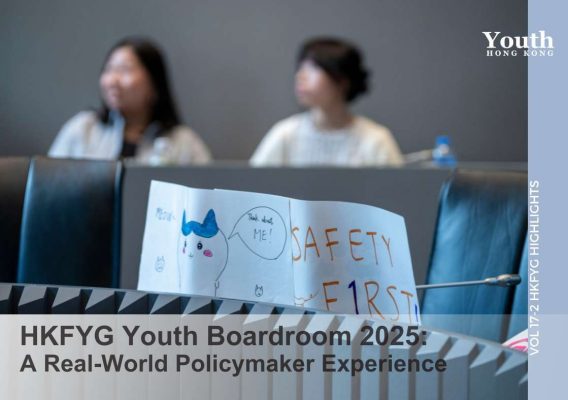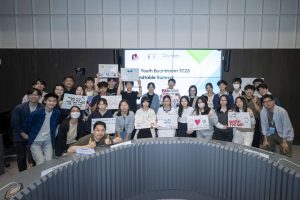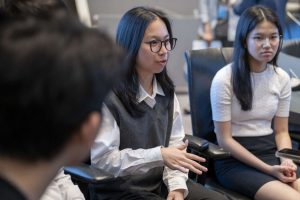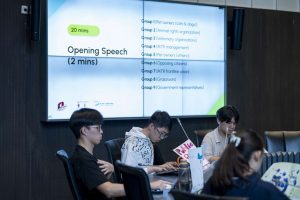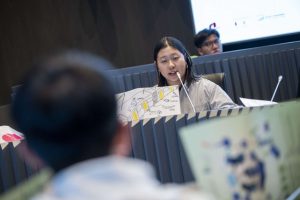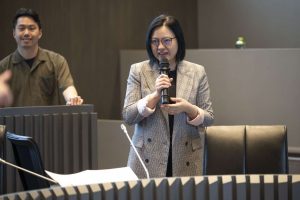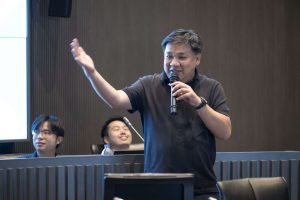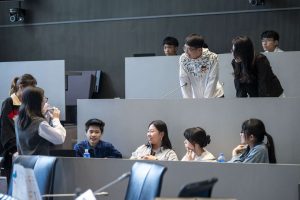The HKFYG Youth Boardroom trains students to debate, negotiate, and build consensus on real issues.
You may be familiar with the heated debates at school Model United Nations conferences, where student delegates represent different countries to discuss global issues, but have you experienced a localised format where students gain hands-on experience in discussing, debating, and shaping local policy? The HKFYG Youth Boardroom roundtable summit offers exactly that experience.
At the HKFYG Leadership Institute, located in the historic Former Fanling Magistracy, students showcased what they have learned in their training lessons on mediation, debate, and communication skills. They were presented with a pressing issue currently debated in Hong Kong: “Should Hong Kong implement pet-friendly carriages in the MTR, and if so, how?”
Wong Kit-wai, Elizabeth, a seasoned debate education specialist and founder of WKW Strategic Communications Studio, delivered training throughout the programme. She emphasised the unique niche the HKFYG Youth Boardroom offers compared to other debate training programmes.
Unlike other roundtable debates that focus on highlighting strengths and attacking opponents’ weaknesses, she said this summit incorporated a consensus session for students to come up with proposals to solve real-world issues. “Our goal is to provide a realistic context for students to learn effective communication. Debates that emphasise differences alone are insufficient for resolving real-world issues, and collaboration is essential. We aim to teach students how to negotiate and find common ground amid diverse perspectives,” Elizabeth said.
The roundtable summit lasted four hours. Students were assigned various stakeholder positions on the pet-carriage issue, such as veterinarian, pet owner, MTR management, and MTR frontline union.
To make the roundtable discussion as realistic as possible, stakeholder assignments were designed to be as concrete as they could be. For instance, among the pet owner roles, students were assigned positions as cat and dog owners, and exotic pet owners. This encouraged them to analyse the term “pet” and understand how the nature of different animals leads to varying needs in pet carriages.
During the second part of the summit, students presented their debate speeches on whether the Hong Kong government should implement pet-friendly carriages in the MTR. They were eager to share their findings after spending nights researching the topic.
Tsui Shui-bong, a Form 5 student from King Ling College representing veterinarians, shared that he spent three nights preparing his speech and delving into animal wellness. He noted that, unlike previous speech preparations that focused solely on statistics, he aimed to make his speech engaging and emotional—a skill he developed in Elizabeth’s training sessions.
Yiu Tung, a Form 4 student from Diocesan Girls’ School, delivered a speech representing exotic pet owners. In her preparation, she sought examples that the Hong Kong MTR could reference. “We also extended our research to cities like London, where the MTR also invested and operated a train line, to see if there are similar pet carriage policies we could learn from,” Toby said.
After the speeches, students participated in an intense open discussion and debate, exploring the perspectives and concerns of the stakeholders they represented. From frontline workers’ objections regarding how a large number of pets on board could impact employee benefits, such as allergy health issues and increased cleaning hours, to pet owners’ advocacy for animal rights, the boardroom was filled with passionate voices and discussions.
As the debates concluded, students faced an even greater challenge: reaching consensus and developing a pet-carriage policy proposal that would satisfy all stakeholders while maintaining their positions.
Before sharing the proposals and voting on the best one, student stakeholders were asked to lobby for support. With only three proposals allowed for submission, each group needed to build alliances and develop a cohesive proposal that everyone could agree upon. They were then asked to present their proposals and field questions from the audience during the Q&A session, where they listened to their opponents’ concerns and sought ways to address them effectively.
Wong Yat-sum, a Form 4 student from Good Hope School, noted that “reaching consensus” was a new topic for her. She learned a great deal about negotiation skills through the training and ultimately performed well during the proposal and discussion sessions.
“The key is to listen. I learned how to pay attention to people’s concerns and the perspectives behind their objections. This feedback was invaluable for me to step back and refine my proposal to better accommodate different stakeholders,” Ingrid said. “Through this training, I realised that effective compromise is an art of communication.”
Lam Yick from Ying Wa College appreciated the lobby session for its practical lessons in negotiation skills. He expressed his interest in English public speaking and found the Youth Boardroom programme enjoyable, as it provided a rare opportunity to experience what political lobbying is like.
Trainer Law Wing-chung, also Founder and Director of Hong Kong-based strategy and public relations agency Jervois One, provided feedback to students after they voted on the best proposals. Through this lesson, he hopes students understand the key difference between writing and speaking, as well as the art of public speaking.
Trainer Elizabeth greatly valued the roundtable summit format, as it offers a unique opportunity for public speaking training in Hong Kong. Students not only showcase their differences through debate but also seek common ground for collaboration during the consensus-building phase.
“While debate is often a zero-sum game, reaching consensus is like finding the highest common factor in math. You need to identify common ground with the other party to advance your agenda, and I believe that most great innovations and collaborations in society do not occur from a single individual,” Elizabeth explained. “Rather, they emerge from a collective mindset formed through communication, understanding, and negotiation.” ■
The Youth Boardroom 2025 Roundtable Summit, organised by the HKFYG Leadership Institute, is supported by the Standing Committee on Language Education and Research (SCOLAR) and funded by the Language Fund. Committed to nurturing the next generation of leaders, the Institute designed this programme to cultivate empathetic leadership and enhance collaborative problem-solving skills.


